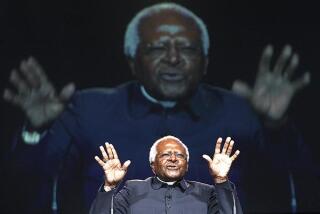Percy Yutar, 90; Led Prosecution of Mandela in 1964 Treason Case
- Share via
JOHANNESBURG, South Africa — Percy Yutar, the prosecutor who won life sentences against Nelson Mandela and other African National Congress leaders in the 1964 Rivonia treason trial, has died. He was 90.
Yutar died Saturday, months after suffering a stroke and a heart attack, said his wife, Cecilia, according to the South African Press Assn.
As one of the most prominent Jewish lawyers working in the anti-Semitic climate of the racist, apartheid government, Yutar was said to have worked tirelessly to prove his loyalty to South Africa.
Despite the prejudice that confined him to clerical jobs when he became a lawyer, Yutar rose to become the first Jewish attorney general in the country when he was named the top lawyer of the Orange Free State in 1968.
His biggest case was the Rivonia treason trial, which took its name from the area near Johannesburg, where some of Mandela’s ANC colleagues were arrested in a raid on the secret headquarters of their guerrilla movement.
During his relentless--and what some critics called shoddy--prosecution of the case, he argued that Mandela, Walter Sisulu and other ANC leaders were lying when they said they represented the dreams of South Africa’s blacks for freedom.
“The deceit of the accused is amazing.... They took it on themselves to tell the world that the Africans in South Africa are suppressed, oppressed and depressed,” Yutar said. “It is a great pity that the rank-and-file of the Bantu [blacks] in the country, who are peaceful, law-abiding, faithful and loyal, should have been duped by false promises.”
In his autobiography, “Long Walk to Freedom,” Mandela called Yutar shrill and accused him of petty machinations during the case.
Joel Joffe, the lead defense attorney in the trial, said later that Yutar was particularly aggressive toward the Jewish defendants.
He “seemed to regard it as a duty to prove to the government that there were ‘good Jews,’ through his own enthusiastic persecution of these subversive Jews,” Joffe said.
After the collapse of apartheid, Yutar worked fruitlessly to rehabilitate his image in the new South Africa.
Despite his energetic prosecution in the Rivonia case, Yutar insisted he had saved them from hanging by charging them only with sabotage instead of treason, though sabotage also carried the death sentence.
Nevertheless, in what was seen as the ultimate act of reconciliation, Mandela invited Yutar for lunch in 1995, a year after he was elected the country’s first black president.
Yutar later called Mandela, whom he had once accused of being a Communist stooge plotting a bloody revolution, “a saintly man.”
He was born in Cape Town after his family emigrated from Lithuania. His father was a butcher, and Yutar was expected to work in the family business, but he was seriously injured in an accident that left the fingers on one hand mangled.
He attended the University of Cape Town on a scholarship and was eventually awarded a doctorate in law.
After winning the Rivonia case, Yutar was named attorney general of the Orange Free State and later the Transvaal. He retired 12 years later.
In addition to his wife, Yutar is survived by a son, David.
More to Read
Sign up for Essential California
The most important California stories and recommendations in your inbox every morning.
You may occasionally receive promotional content from the Los Angeles Times.













